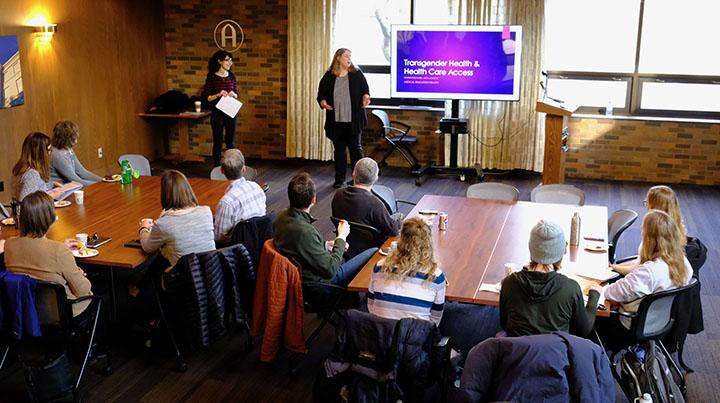Augie Alumnus and student doctor, Christine Herb, discussed the lack of inclusion in healthcare for transgender and genderqueer people on March 2 in the Wilson Center.
Herb explained that many of the issues related to healthcare are mostly a result of the lack of training for physicians.
“Medical school does not really train us to treat transgender and genderqueer people, and so these people go to an environment where they are being mistreated,” Herb said.
Sometimes, physicians discriminate against transgender and genderqueer people which limits their access to treatment. “If trans and genderqueer individuals are denied treament, this dramatically increases suicide rates,” Herb said
Senior Willow Kornoski, women and gender studies and public health major, is currently researching this topic for their senior inquiry.
Kornoski believes that the impact of the issues in trans and genderqueer healthcare is especially relevant at Augie as Augustana does not have a clinic on campus for students.
Because of this, students seek healthcare off-campus, where clinics and healthcare facilities have varying degrees of transgender training, education and resources.
“To make the problems in the system more well known can help to educate the wider public on the places where we aren’t doing enough, and hopefully help us to bridge those gaps so trans and genderqueer people can access the same levels of compassionate and affirming healthcare that cisgender individuals experience,” Kornoski said.
Normalizing the discussion about transgender healthcare is something Kornoski believes will make it easier for transgender people to talk openly about their experiences.
“This can help not only transgender and genderqueer people, but also individuals who just don’t fit our societal understandings of ‘male’ and ‘female,’” Kornoski said.
Junior Kaitlyn Watkins, a student that attended the talk, believes that healthcare is a basic human right and no one should get turned away no matter what their identity is. “the presenter discussed the multitude of secondary problems the transgender community faces because of how they are treated in society. This includes severe mental health issues (including suicide) and how many deal with those issues through substance abuse,” Watkins said. “Everyone deserves to be accepted for who they are, but to know that not everyone is accepted is heartbreaking. It’s a reminder that you never really know what’s going on in someone’s life.”
During the talk, Herb explained how physicians are the middle people for transgender people to transition. “The issue is we currently live in a political climate where our current administration is rejecting every anti-discrimination policy and that were supposed to protect trans people” Herb said.
The fight for social justice is something Herb believes should be applied to the transgender and genderqueer community.
Herb explained that the U.S is the superpower of the world, and that with that title comes responsibilities to set an example for other countries and how they should act towards the LGBTQIA+ community.
“We act like we are the land of the free, and we want to give the illusion that we are accepting of all people but in reality we aren’t, and it’s starting to show in our policies,” Herb said.
The importance of addressing these issues, Herb believes, would mainly be to educate people. “We need to begin unpeeling people’s ignorance by just exposing them to the struggles of trans and genderqueer people. Hopefully this is the start of a new journey to expose everyone to these ideas”
Watkins also expressed her new perspective on the information given and why it should be important to every member of our community. “I think it is always important to talk about issues that face people in our world no matter who is impacted by those issues,” Watkins said.










































































































Alex • Mar 6, 2020 at 5:29 pm
What kind of healthcare are they being denied specifically? The general healthcare and annual exams would be consistent regardless of their gender identity. Transgender males may not want a prostate exam but it would be standard for a male patient with male sex organs to receive such care. The same would go for transgender women who might not want a pap smear because they identify as male but this would be a necessary and important part of overall healthcare. Requests for hormone therapy that is not associated with birth gender identity requires more than understanding of social norms and deeper understanding of the health risks both long term and short term associated with these therapies as well as insurance company denial of coverage. As for mental health issues that is a larger issue also with the overall market of mental healthcare and coverage being dismal at best for all patients and not specific to transgender individuals.